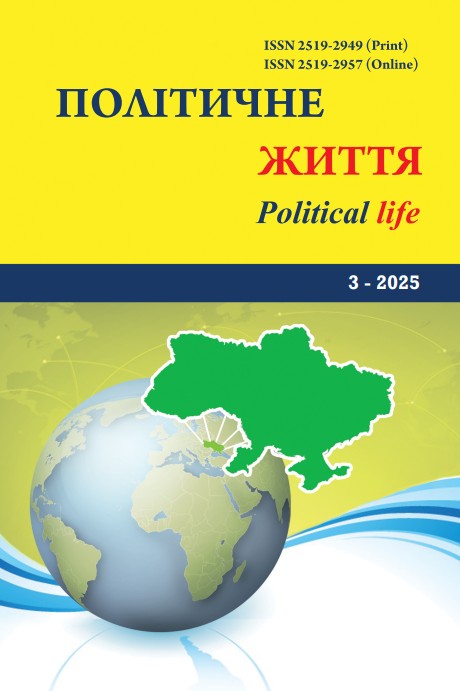Соціальний реконструкціонізм в парадигмі освіти для сталого розвитку
DOI:
https://doi.org/10.31558/2519-2949.2025.3.16Ключові слова:
соціальний реконструкціонізм, освіта для сталого розвитку, критична педагогіка, філософія освіти, активне навчання, агенти змінАнотація
Стаття присвячена аналізу актуальності ідей критичної педагогіки та соціального рекострукціонізму, враховуючи парадигму Освіти для сталого розвитку ООН та ЮНЕСКО. Автори послідовно аналізують ідеї класичної критичної педагогіки та соціального реконструкціонізму щодо функціонування освітніх установ як агентів змін. У дослідженні розкрито спільне ідеологічне підґрунтя класичної та сучасної педагогіки змін. Соціальний реконструкціонізм – це філософія освіти, орієнтована на студента, де школи та їхні учні розглядаються як рушійна сила важливих соціальних та економічних змін. Парадигма освіти для сталого розвитку додає до цього переліку ще й актуальний екологічний контекст. Така ідеологічна основа зближує соціальний реконструкціонізм та концепцію Освіти для сталого розвитку. У філософії соціального реконструкціонізму школи мають допомагати учням розвивати необхідні навички вирішення проблем, щоб впоратися з гендерною та расовою нерівністю, бідністю, безпритульністю та соціальною несправедливістю. Як наслідок, реконструкціоністська філософія освіти передбачає персоналізований навчальний план, який допомагає учням визначити власне навчання під свої вихідні дані. Підхід до навчання у соціальному реструкціонізмі орієнтований на учня, тому роль вчителя зводиться до медіації навчального процесу. Тож замість пасивності школи мають стати агентами прогресивних соціальних змін. Таким чином, соціальний реконструкціонізм виступає орієнтованою на майбутнє філософією освіти, яка здатна ініціювати необхідні зміни в освітній практиці. Використовуючи методи порівняльного аналізу, системного підходу та аналогії, автори приходять до висновків про наступність парадигми Освіти для сталого розвитку щодо соціального реконструкціонізму як філософії освіти. На думку авторів, ключовий перетин ідей філософії соціального реконструкціонізму та Освіти для сталого розвитку можна впровадити в освітніх закладах, надаючи учням більше свободи у визначенні вектору власного навчання, враховуючи цілі сталого розвитку. Дискусії, спільні навчальні проекти, ситуаційний аналіз та рефлексивні есе, а також інші методи навчання мають бути зосереджені на взаємозв’язку соціальної, економічної та екологічної сфер, а також на глобальному взаємозв’язку всіх країн та економік світу. Обговорення гендерної, соціальної та економічної нерівності, надмірного споживання, бідності, надмірного використання природних ресурсів дозволять учням аналізувати ці проблеми та знаходити рішення в майбутньому.
Посилання
Джурило А.П. Освіта для сталого розвитку в навчальних програмах європейських шкіл. Дидактика. 2024. С. 191-193.
Ільченко В., Гуз К. Еволюція ідей освіти для сталого розвитку. Витоки педагогічної майстерності. 2022. №. 29. С. 117-122.
Коренева І.М. Феномен «Освіта для сталого розвитку»: сутність та сучасні особливості концепту. Український педагогічний журнал. 2018. №2. С. 113-123.
Підліснюк В. та ін. Сталий розвиток в Україні: роль освіти. Путівник. К., 2005. 88с.
Brameld T. Reconstructionism as radical philosophy of education: A reappraisal. The Educational Forum, 1977. №42(1), 62-67.
Breithorde M.L., Swiniarski L. Constuctivism and Reconstructivism: Educating teachers for world citizenship. Australian Journal of Teacher Education. 1999. № 24(1). С. 1-17.
Counts, G.S. Dare the school build a new social order? Southern Illinois University Press. 1978. 56 с.
Erkilic T.A. Importance of educational philosophy in teacher training for educational sustainable development. Middle-East Journal of Scientific Research. 2008. № 3(1). с. 1-8.
Freire P. Pedagogy of the Oppressed (30th anniversary ed.). Bloomsbury. 2000. 182 с.
Lynch M. Philosophies of education: 3 types of student-centered philosophies. 2016. URL: http://www.theedadvocate.org/philosophies-education-3-types-student-centered-philosophies/
Mansilla V.B., Jackson A. Educating for global competence: Learning redefined for an interconnected world. In H. Jacobs (Ed.), Mastering Global Literacy (5-27). Solution Tree. 2013. URL: http://pz.harvard.edu/sites/default/files/Educating%20for%20Global%20Competence%20Short%20HHJ.pdf
McLaren P. Revolutionary Critical Pedagogy. InterActions: UCLA Journal of Education and Information Studies. 2010. № 6(2). С 1-11.
Schriewer J. Globalisation in education: Process and discourse. Policy Futures in Education. 2003. № 1(2). С. 271-283.
Shor I. Education is politics: Paulo Freire’s critical pedagogy. In Paulo Freire: A critical encounter. 1993. (pp.24-36). Routledge.
UNESCO. Education for sustainable development. 2024. URL: https://www.unesco.org/en/sustainable-development/education
Zuga K.F. Social Reconstruction curriculum and technology education. Journal of Technology Education. 1992. №3(2). С 48-58.

